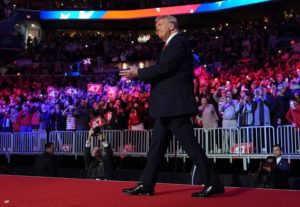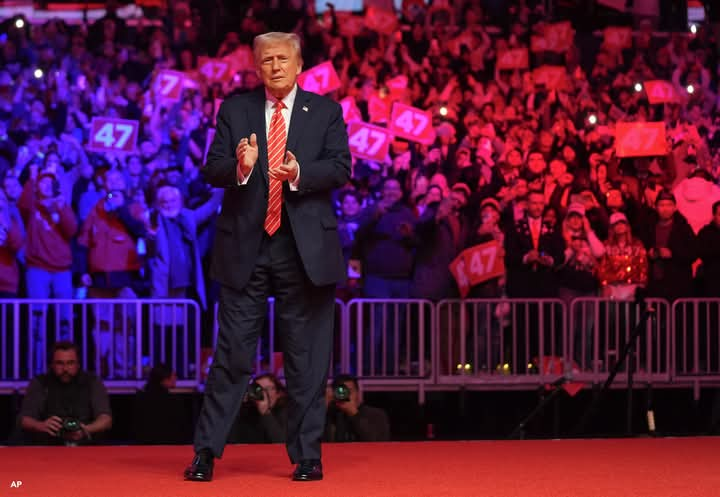
By Adeyemi Adekunle
Donald Trump, the 45th president of the United States, is on the brink of an extraordinary return to the White House. On Monday, he will be inaugurated as the country’s 47th leader, marking the first time in modern history that a former president has reclaimed the Oval Office after an electoral defeat. This unprecedented political comeback is rife with controversies, historical significance, and fierce public debate.
Trump’s victory in the November 2024 election against Democratic candidate Kamala Harris represents both a triumph for his unwavering base and a source of deep polarization for the country. The inauguration ceremony, moved indoors to the U.S. Capitol Rotunda due to an Arctic blast sweeping Washington, will see a select 600 attendees witness history.
While millions of Americans will watch the event on television, nearly 250,000 supporters who had secured tickets to the originally planned outdoor ceremony will instead be left with commemorative keepsakes. The extreme cold, reminiscent of Ronald Reagan’s 1985 inauguration, also led to the cancellation of the traditional inaugural parade along Pennsylvania Avenue, which has been replaced by an indoor celebration at the Capital One Arena.
Trump’s return to power is historically significant for several reasons. At 78, he joins an exclusive group of presidents who served nonconsecutive terms, a distinction last held by Grover Cleveland in the late 19th century. However, his presidency also carries the weight of unprecedented controversy. Trump will be the first felon to assume the presidency, following his conviction on 34 charges of falsifying business records tied to a $130,000 payment to adult film actress Stormy Daniels.
While the judge in the case imposed no penalties, Trump’s legal battles remain a focal point for critics who question his moral and ethical fitness to lead. Furthermore, allegations that he attempted to overturn the results of the 2020 election were dropped after his 2024 win, owing to a longstanding Department of Justice policy that prohibits prosecuting sitting presidents.
Beyond the historical optics, Trump’s re-entry into the White House signals a dramatic shift in U.S. policy direction. Known for his bold and often controversial executive actions during his first term, Trump has promised to hit the ground running with an agenda designed to undo much of President Joe Biden’s work.
Key among his priorities is a commitment to tackling immigration, starting with a pledge to deport over 11 million undocumented immigrants. Trump has vowed to prioritize individuals with criminal convictions and those whose asylum applications have been denied.
The implementation of this plan has already sparked controversy. A leaked report about potential deportation operations in Chicago has prompted backlash, raising concerns about security risks and operational secrecy.
Tom Homan, Trump’s newly appointed border czar, criticized the leak, calling it a threat to the safety of law enforcement officers and the efficacy of the plan. Critics, meanwhile, have questioned the feasibility of such mass deportations, citing logistical and humanitarian concerns.
Trump’s return also comes with promises to dismantle Biden-era policies on climate change, healthcare, and international relations. His campaign rhetoric often centered on portraying Biden’s presidency as ineffective and detrimental to American interests. Supporters see Trump’s return as a chance to restore what they view as policies that prioritize national security, economic growth, and traditional values. His critics, however, warn of potential chaos, polarization, and authoritarian tendencies that could deepen the country’s divisions.
The political landscape Trump is stepping into is markedly different from when he left office in 2021. Biden’s administration worked to reverse many of Trump’s hallmark policies, from environmental deregulation to immigration.
Trump now faces not only a divided Congress but also a polarized public. While his supporters have doubled down on their loyalty, his opponents remain adamant that his return will damage the country’s democratic institutions.
Amid these controversies, Trump’s inauguration has become a symbol of both celebration and dissent. Supporters gathered outside the Capitol on Sunday, waving flags and cheering in anticipation of their leader’s return.
For many, Trump represents a bold and unapologetic vision for America, one that they believe is essential for restoring the nation’s global standing. Linda Gray, a Michigan resident attending the rally, described Trump’s return as a moment of vindication for millions who felt overlooked or marginalized by recent political shifts.
Yet, the opposition remains steadfast. Democratic leaders have signaled their readiness to challenge Trump’s policies in Congress and the courts. They argue that his approach to governance undermines core democratic principles and threatens vulnerable communities. Civil rights groups have also raised alarms over his immigration policies, fearing widespread violations of human rights and due process.
As Trump prepares to take office, the world is closely watching this unprecedented moment in American history. Allies and adversaries alike are eager to see how his administration will handle pressing global challenges, from climate change to ongoing geopolitical tensions. The stakes are high, and the spotlight on Washington has never been brighter.
Trump’s second term marks a critical juncture for the United States. His presidency will test the durability of American democracy, the effectiveness of its checks and balances, and the resilience of a nation deeply divided. Whether Trump’s leadership brings renewed prosperity or further polarization remains to be seen, but one thing is certain: his return to power is a defining chapter in the nation’s evolving political narrative.



